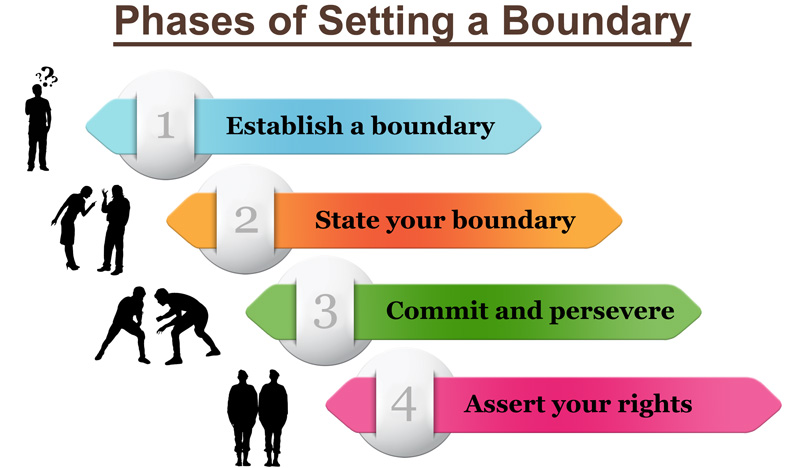Setting personal boundaries is an important part of self-care. As humans, we are often told what to do and how to act by our parents, friends, spouses, or bosses. Sometimes these people can be well-meaning – they want us to be happy and healthy. Other times they may not have the best intentions for us – it could be that they are trying to manipulate us or take advantage of us in some way. The problem with this kind of behavior is that it’s difficult for many people to know when enough is enough. They’ll put up with abusive relationships because their partner insists on them doing so; working long hours at a job where the boss abuses them verbally; staying in friendships even though their friend doesn’t value their time or opinions.
Contents
What are Personal Boundaries?

Personal boundaries are limits we set in our relationships. We all have them, but many people struggle with setting clear and healthy boundaries for themselves and others. When we allow someone to cross a boundary it can lead to problems such as:
- Emotional pain or stress
- A lack of respect from the other person
- Confusion about what your values are
- Feeling taken advantage of or used
- A loss of self-respect
To protect ourselves from these negative outcomes, we need to learn how to set personal boundaries. They can be different for every person and will vary depending on the type of relationship you have with someone. For example, your boundary for a friend may be that you won’t let them borrow your car without asking first. In a romantic relationship, you need to decide which activities are OK and which rules you want to follow. Make sure that everyone can talk with each other about what is happening in their own lives.
Why Is It Important To Maintain Personal Boundaries?

Maintaining personal boundaries is important for a few reasons:
- It allows us to have healthy and fulfilling relationships. We can’t control what other people do, but we can decide how much we’re going to let them affect our lives.
- It helps us stay true to ourselves. When we know what our boundaries are, it becomes easier to stay true to our values and beliefs.
- It helps us maintain our self-respect. If we don’t stand up for ourselves and enforce our boundaries, we’ll eventually lose respect for ourselves.
How Can I Set Personal Boundaries?
- The first step in setting personal boundaries is recognizing when someone is crossing one of your boundaries. This can be difficult, especially if you’re used to people crossing them without consequence. You may need to start by paying attention to how you feel when someone does or says something that’s not OK with you.
- The next step is communicating your boundaries to the person who is crossing them. This can be done in a variety of ways, but it’s important to be clear and concise. You may want to start by telling them what the boundary is, why it’s important to you, and what will happen if they continue to cross it.
- It’s also important to be willing to enforce your boundaries. This means standing up for yourself when someone tries to cross them and not letting people get away with violating your boundaries.
How Do I Know If Someone Is Crossing My Boundaries?
There are different ways someone can cross your boundaries. Be aware of what they are and how you feel when they do it.
- Physical Touch – Some people prefer a lot of physical touches while others don’t like any contact at all. When someone touches you in a way that makes you feel uncomfortable, or when someone is touching you too much, it’s important to know.
- Emotional Manipulation: Some people are experts at emotional manipulation. They know what to say and do to get the response they’re looking for. If you find yourself constantly feeling bad, sad, or upset after talking with someone, that person may be emotionally manipulating you.
- Your Time: If someone is taking up too much of your time, it may be crossing a boundary. For some people, this means not letting anyone call them after nine o’clock at night or texting them more than one message in a row on any given day.
- Verbal Attacks – You should remember what people say and how they talk to you. They might not like you, but that doesn’t mean they’re right.
- Emotional Intrusion – This includes things like talking about themselves too much, not respecting your time or opinions, and trying to control you.
- Excessive Requests – People who constantly ask for favors or make unreasonable demands can be crossing your boundaries.
How Can I Enforce My Boundaries?

There will come a time when you need to enforce a boundary that someone is crossing. Here are some tips for doing so:
- Be clear and direct about what your boundaries are and how they’re being crossed. This will help the other person know exactly what behavior needs to change without you having to go into too much detail.
- Choose an appropriate time to talk with them when you won’t be interrupted or distracted.
- Be willing to say no when you need to and stick with your decision, especially if it’s difficult for you.
- Don’t let people try to make excuses for their behavior or blame others when they’ve crossed a boundary. This will allow them to save face at the expense of hurting or embarrassing you.
- If someone is infringing on your personal boundaries, you might need to take the relationship elsewhere.
How Can I Help Someone Who Doesn’t Have Boundaries?
People who don’t have personal boundaries often need help identifying and setting them. If you know someone who falls into this category, here are some things you can do to help:
- Start by asking them what their boundaries are and how they feel when someone crosses them. This will give you a better understanding of where they’re at and what kind of help they may need.
- Encourage them to communicate their boundaries to the people in their lives. This could be done by talking or leaving notes.
- Help them recognize when other people are crossing their boundaries so that they can say something instead of bottling up how they’re feeling inside.
- Be patient and supportive as they work to set boundaries that may be difficult for them.
- It’s important to remember that everyone is different and setting personal boundaries may not be easy for everyone. If you’re having difficulty enforcing your boundaries, it’s best to seek professional help. Some therapists specialize in helping people develop healthy personal boundaries.
Conclusion
The brain is a complex organ, and it’s important to understand its mechanics in order to get the most out of your personal boundaries. By understanding which parts are responsible for what actions or thoughts, you can better plan how best to protect yourself from unwanted intrusions into your life. We’re happy to help! Contact our team today if you want more information on setting up healthy boundaries that will maximize your happiness while also respecting others’ needs.
If you are looking for affordable Online Counseling MantraCare can help: Book a trial therapy session


